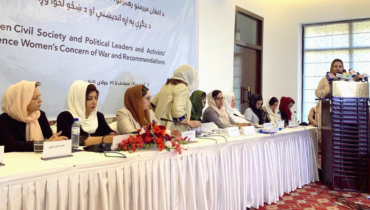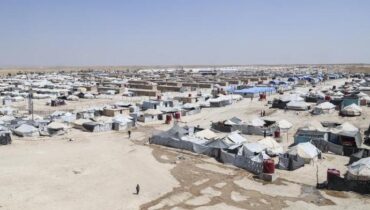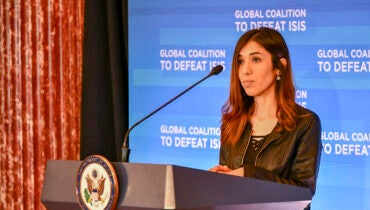Some of the most troubling developments from ISIS-controlled regions of Syria and Iraq are the stories of unimaginable sexual violence against women and girls. Interviews with women who have escaped ISIS camps reveal extreme brutality, and journalists and human rights organizations continue to document evidence of sexual slavery, forced marriage, kidnapping, rape and other atrocities. However, sexual violence perpetrated by extremist actors has remained largely framed as an issue of protection of civilians. On December 14th, the Georgetown Institute for Women, Peace and Security and the Center for Middle East Policy at Brookings hosted a discussion on “Women Under the Rule of ISIS” to expand the ways in which sexual violence in Syria and Northern Iraq is understood. Speakers Ambassador Melanne Verveer, executive director of GIWPS, Sherri Kraham Talabany, president of the SEED Foundation Kurdistan, and Kenneth Pollack, Senior Fellow at Brookings, highlighted the ways in which ISIS fighters use sexual assault as a terror tactic, and the long-standing effects this has had on women and communities in Northern Iraq and Syria. Addressing sexual violence is not only a question of protection; recognizing the ways in which it supports and sustains ISIS reinforces why combatting sexual violence should be a central part of effective counterterrorism response.
Ambassador Verveer reminded the audience that sexual violence is not an inevitable consequence of conflict, but a systematic and strategic tactic of war. The impacts and uses of sexual violence in war have been well documented, but until recently research on violence against women in conflict has been ignored in discussions about countering terrorism and extremism. Research from the women, peace and security field has shown that these types of atrocities have long-lasting impacts that continue to affect communities for generations. Sexual violence is used because it is one of the cheapest and most effective tools to destabilize entire communities, and its psychological and physical effects have a society-wide impact beyond its immediate victims.
The use of sexual violence by ISIS has reached unprecedented levels of brutality, and is accompanied by a call for regressive gender politics central to their mission. ISIS uses sexual violence not only to punish and disrupt the communities it seeks to conquer, but also for internal cohesion and recruitment purposes. Ken Pollack referred to a New York Times story confirming that ISIS uses sex slavery as a tool to attract men from conservative societies where casual sex is forbidden, and outlined a number of other uses for brutal practices in creating group loyalty. Use of sexual violence by ISIS follows patterns identified by Dara Cohen of how insurgent groups use rape for combatant socialization. Rape can enforce group cohesiveness by entrenching collective culpability, desensitizing new fighters, and alienating recruits from normative social and moral frameworks. Sexual violence is also an income-generating activity for ISIS, which has adopted the practice of selling women and girls into slavery to the general population in Syria and Iraq, as well as through international human trafficking networks.
Despite extensive documentation of its strategic uses, sexual violence continues to be an afterthought in approaches to counterterrorism, and is understood primarily in the context of protection of civilians. Seeing sexual violence as a strategic tactic of extremist groups can help shift the dialogue. By working to combat sexual violence, the international community can seriously undermine one of the most effective destabilizing strategies of terrorist and extremist organizations.
As counterterrorism policies begin to incorporate these issues, it is important to understand sexual violence within the larger frame of gender equality. The focus on sexual atrocities perpetrated against women often eclipses any discussion of women as agents for change, or as violent actors in terrorist and extremist groups. Making sexual violence a counterterrorism priority must be accompanied by a wider conversation about the multiplicity of women’s roles in countering and perpetrating violence. Widespread sexual violence is aided by permissive social norms, systematic inequalities, economic disempowerment, and regressive visions of women’s roles. In the case of ISIS, sexual violence is explicitly tied to a social program that denies women rights and agency, and is used as a means of achieving that end. Decoupling the issue of sexual violence from women’s empowerment more broadly leads to ineffective and unsustainable solutions that do not address the root causes and drivers of violence against women and girls.
All three speakers underlined the importance of taking immediate steps to better address sexual violence as a tactic of terror. Ending impunity by documenting and persecuting sexual crimes is a critical first step. Supporting women survivors through economic, medical and psychosocial services – what SEED Foundation’s work focuses on – is also crucial in mitigating the long-term effects of sexual violence on the communities to which they return.
As evidence of brutal sexual violence continues to emerge from ISIS-controlled regions, it is increasingly clear that the issue is closely linked to the rise of extremism. ISIS, Boko Haram and other terrorist actors systematically use women’s bodies in their efforts to spread fear and destabilize societies. Greater research and resources must be put towards understanding why and how these groups use sexual violence in order to craft more nuanced responses that both address the impacts of sexual violence on women and communities and undercut the benefits accrued by terrorist groups.
About the Author
Rebecca Turkington is a Program Manager at the Georgetown Institute for Women, Peace and Security. She holds a BA in International Relations/History from Wellesley College, and is currently pursing a MA in Security Studies at Georgetown University, concentrating in terrorism and substate violence. Prior to joining the Institute in 2013, she worked on women’s political participation at the National Democratic Institute, the Women in Public Service Project and Moroccan Ministry of Interior.


